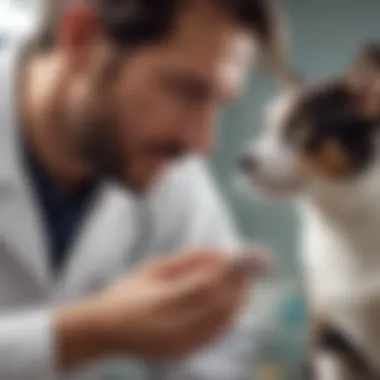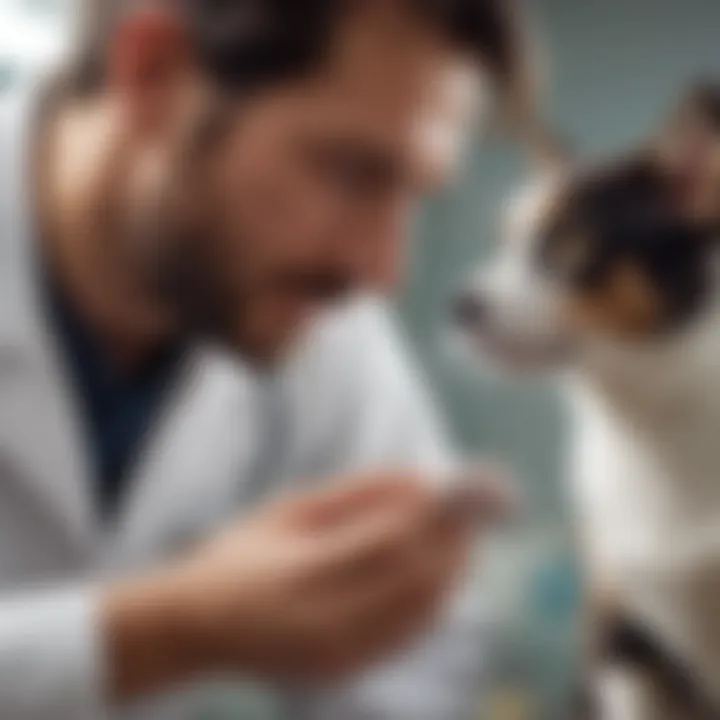Understanding Diarrhea Every Other Day in Pets


Intro
Pets hold a special place in our hearts, and as responsible pet owners, it’s our duty to ensure they are healthy, happy, and thriving. One health concern that often sneaks up on pet owners is diarrhea, particularly when it presents itself every other day. This can be perplexing and stressful for both pets and their human companions. Understanding the causes and implications of this condition is crucial for providing appropriate care and interventions.
Diarrhea in pets is not just inconvenient; it can lead to more significant health issues if not addressed in time. By diving deeper into the reasons behind this recurring problem, we can equip ourselves with the knowledge necessary for effective management.
This article aims to shed light on this topic by exploring essential aspects such as dietary factors, potential health problems, and proactive measures pet owners can take. Recognizing when to consult a veterinarian is also a key part of ensuring our furry friends remain in good spirits and good health.
Understanding Your Pet
Pet owners need to grasp the specifics of their pet’s breed and temperament to navigate health concerns effectively. Not every pet is formed from the same mold; each breed may come with its own unique traits and predispositions to certain conditions, including digestive issues.
Breed Traits
- Large breeds like Great Danes or St. Bernards might suffer from bloat, which can lead to digestive distress.
- Smaller breeds, such as Chihuahuas, can be more sensitive to dietary changes.
Being aware of these predispositions can inform decisions on diet and care.
Common Temperaments
Understanding your pet's temperament can also provide insights.
- Some pets, especially anxious breeds, might experience stress-induced digestive issues.
- Energetic pets may have sudden changes in their gut health due to their active lifestyles.
Special Needs
Some pets have unique needs that require attention.
- Senior pets may not process food as effectively, leading to occasional digestive upset.
- Pets with medical histories or allergies often need specialized diets to keep their systems functioning smoothly.
Pet Care Essentials
Proper care and attention to health play a significant role in preventing recurring diarrhea in pets. Establishing a well-rounded regimen goes hand in hand with responsible ownership.
Nutrition and Feeding Guidelines
Maintaining a balanced diet is fundamental. Focus on high-quality pet food that caters to your pet's specific needs.
- Avoid abrupt dietary changes; gradually introduce new foods over several days.
- Staying hydrated is equally important; offer fresh water at all times.
Grooming Tips and Techniques
Regular grooming ensures that allergens and irritants are kept at bay.
- Brush your pet often to reduce fur ingestion—common in long-haired breeds.
- Bathing your pet reduces the risk of skin issues, which can sometimes connect with digestive health.
Health and Wellness
Regular vet check-ups are essential.
"Prevention is better than cure. Always prioritize wellness examinations to catch subtle signs of distress."
- Keep vaccinations and deworming schedules up to date.
- Monitor body weight and any unusual behaviors that may arise.
Training and Behavior
A well-trained pet contributes to a stable environment, minimizing stress-induced health concerns. Training is not just about obedience; it’s about enriching the pet's overall experience and comfort.
Basic Training Techniques
- Utilize positive reinforcement to promote desirable behaviors. Encouragement can reduce anxiety that leads to gastrointestinal issues.
- Socialize your pets; exposure to varying environments can help them adapt better and lessen anxiety triggers.
Behavioral Problems and Solutions
- Identify any behavioral triggers that may lead to digestive issues—fear or separation anxiety can have physical manifestations.
- Consult with a professional trainer or behaviorist if challenges arise.
Mental Stimulation Activities
Investing in mental exercises can have astounding impacts on a pet's wellbeing.
- Puzzle feeders can combine fun with sustenance, encouraging slower eating.
- Engaging your pet in daily activities prevents boredom and related stress behaviors.
Engaging with Your Pet
Building a strong bond with your pet can positively influence their mental state and overall health, which in return contributes to digestive stability.
Interactive Games and Toys
Tap into your pet's intelligence.
- Throw in some interactive toys that prompt problem-solving. This keeps them engaged and eases stress.
- Rotate toys regularly to maintain interest.
Safe Outdoor Activities
Venturing outside isn’t just an exercise; it’s a way for your pet to explore and socialize. A change in scenery can enhance vitality.
Family-Friendly Pet Interactions
Creating a nurturing environment where the whole family is involved in care can strengthen emotional well-being. Schedule inclusive activities that allow everyone to bond with the pet.


Pet Adoption and Integration
For those considering adding a new pet to the family, understanding the requirements and potential digestive issues is pivotal.
Choosing the Right Pet for Your Lifestyle
Consider breed characteristics and energy levels.
Preparing Your Home for a New Pet
Ensure that the home environment is safe and welcoming.
Tips for Smooth Intro
Introducing the new pet calmly will help ease transitions.
Efforts to understand and manage a pet's digestive health can significantly impact their quality of life. This exploration of the potential causes behind diarrhea, strategies to manage it, and proactive measures contributes to the wellbeing of our beloved companion animals.
Intro to Diarrhea in Pets
Diarrhea in pets is a common yet often misunderstood condition that can signal various underlying issues. It's essential for pet owners to grasp why this condition occurs and how frequent bouts, specifically every other day, could indicate something more serious. This introductory section sets the stage for understanding the significance of monitoring our pets’ digestive health.
Understanding diarrhea isn't just about recognizing a messy situation; it can directly affect a pet's quality of life and overall health. When a pet experiences diarrhea on a regular basis, it can lead to dehydration, nutrient deficiencies, and stress, both for the animal and its owner. As responsible guardians, we need to pay attention to even minor changes in our pet's bathroom habits.
This article aims to provide insights that aid in identifying the signs of diarrhea and understanding what frequency and patterns could reveal about an animal's health.
Defining Diarrhea
Diarrhea is defined as an increase in the frequency of bowel movements accompanied by the passage of softer, looser stools than normal. It can be acute or chronic; acute diarrhea comes on suddenly, while chronic diarrhea persists over a longer period. For pets, this condition can manifest in various ways, influencing their behavior and activity levels.
Some common characteristics associated with diarrhea in pets include:
- Change in stool consistency - The stool is watery or extremely loose.
- Increased frequency - More frequent trips outside or to the litter box.
- Potential presence of blood or mucus - This can indicate more serious issues if observed.
Recognizing these signs is critical for timely intervention.
Understanding Frequency and Patterns
When observing a pet with diarrhea every other day, it raises questions about what underlying issues might be at play. Frequent diarrhea can indicate potential dietary indiscretions, stress factors, or even infections.
Pet owners should consider keeping track of their pet's bathroom habits in order to note any changes in:
- Stool appearance - Is it mostly watery? Are there visible changes?
- Duration - Has this been happening consistently over time or does it come and go?
- Any associated symptoms - Is your pet displaying signs of discomfort, lethargy, or loss of appetite?
Keeping a close eye on these patterns not only helps in understanding what may be troubling your pet but can also guide you in discussing specific details with a veterinarian.
"A frequent observation is essential! Understanding the nuances of your pet's health often begins with attention to their bathroom behaviors."
In summary, being informed about diarrhea and its implications leads to better outcomes for our pets. As we delve deeper into this article, we will explore possible causes, related symptoms, and measures that can enhance our pets' overall digestive wellness.
Common Causes of Intermittent Diarrhea
Understanding the common causes of intermittent diarrhea in pets is crucial for pet owners who are grappling with this issue. Diarrhea isn't just a health nuisance; it can signal underlying problems that affect the overall well-being of a pet. By getting familiar with the various triggers, pet owners can take effective measures to address the issues and prevent future occurrences. This section sheds light on specific causes related to dietary issues, infections, stress, and medical conditions. Knowing these facets can empower owners to make informed decisions regarding their pets’ health.
Dietary Issues
Food Allergies
Food allergies in pets can be a prime suspect when it comes to intermittent diarrhea. Many pets react negatively to certain ingredients, such as beef, chicken, or dairy. One key characteristic of food allergies is their unpredictable nature; one day a pet might tolerate a food, and the next, it could lead to unwanted symptoms. This article highlights the importance of identifying these allergens, as it can significantly improve a pet's quality of life. The unique feature of food allergies is that they often require extensive elimination trials to pinpoint the exact culprit, which can be quite a process for any pet owner. While figuring this out can be frustrating, the long-term benefits of eliminating allergens from a pet's diet are positive and can evoke a healthier digestive system.
Inappropriate Diets
Another dietary concern is inappropriate diets that may not meet the nutritional needs of a pet. Pets that consume too many table scraps or low-quality commercial foods can develop digestive issues, including diarrhea. The central point regarding inappropriate diets is that they often lack essential nutrients, leading to gastrointestinal disturbances. This article emphasizes the importance of finding balanced and species-appropriate diets. One unique feature of inappropriate diets is their variety; they can range from human food leftovers to cheap store-brand kibbles. The advantages of adhering to a well-rounded diet for pets are significant, including improved digestion and less frequent bouts of diarrhea.
Infections
Bacterial Infections
Bacterial infections can cause diarrhea in pets more frequently than we might think. A common trait of these infections is their sudden onset, often accompanied by other symptoms like vomiting or lethargy. Pets might ingest harmful bacteria through raw or contaminated food, or from interactions with other infected animals. This article serves as a guide to recognizing the signs and symptoms. A unique feature of bacterial infections in pets is their potential for rapid spread, especially in multi-pet households. The main advantage of identification and quick treatment lies in controlling the infection’s progression, thus safeguarding the health of all pets in the household.
Parasitic Infections
Parasitic infections are another prolific cause of intermittent diarrhea. Parasites like Giardia or roundworms can invade a pet's digestive tract, leading to irregular bowel movements. One significant characteristic of parasitic infections is that they often go unnoticed until they cause significant discomfort or weight loss. This article underscores the importance of routine fecal examinations to detect such infections early. The unique aspect of managing parasitic infections is that they might require deworming medications that target specific life cycles of the parasites. Treatment can address this issue effectively but neglect can lead to long-term health issues.
Stress and Anxiety
Stress and anxiety can surprisingly contribute to digestive upsets, including diarrhea. Pets, like humans, can respond to their environment or experiences with gastrointestinal disturbances. Changes like moving homes, the introduction of new pets, or loud fireworks can momentarily unsettle them. Pet owners must be aware that these stressors can manifest physically in the form of diarrhea. Recognizing stress as a contributor is vital in understanding the pet’s overall behavior as well as their digestive health.
Underlying Medical Conditions
Inflammatory Bowel Disease
Inflammatory bowel disease (IBD) is a serious condition that can cause chronic diarrhea in pets. One key characteristic of IBD is that it refers to a group of disorders related to inflammation in the digestive tract. Understanding IBD is beneficial, as it underlines the significance of seeking veterinary care when these symptoms arise. A unique feature of IBD is that it may require extensive testing and a personalized treatment plan. In contrast to simpler dietary issues, IBD often demands long-term management to achieve remission. The nuances in recognizing and treating IBD can dramatically improve a pet’s life quality.
Metabolic Disorders
Metabolic disorders affect the way a pet processes nutrients, which can lead to digestive irregularities, including diarrhea. Key traits of these disorders include their often complex and varied nature, making diagnosis tricky. This article points out that metabolic disorders can widely vary, from kidney issues to thyroid problems. The unique aspect of many metabolic disorders is their multifaceted nature, which can result in symptoms that influence more than just gastrointestinal health. The importance of veterinary insight cannot be overstated, as early recognition and treatment can mitigate severe health outcomes.
How to Identify Symptoms


Identifying the symptoms of diarrhea in pets isn’t just a matter of observing a change in bowel movements. It's about being vigilant and understanding the nuances that can make all the difference in your pet's health. Diarrhea every other day can be a sign of a broader issue, making it vital for pet owners to be equipped with the knowledge to act appropriately. Knowing how to identify symptoms enhances your ability to intervene promptly, which can prevent your pet from suffering more severe consequences down the line.
Recognizing Diarrhea
Recognizing diarrhea isn’t just about noticing the consistency of stool; it’s a bit like being a detective in the life of your pet. Diarrhea can manifest in various forms, from completely liquid stool to something more formed but still abnormal. Some key points to keep in mind include:
- Color: The color of your pet’s stool can provide clues. Dark or bloody stool can indicate a serious underlying problem.
- Frequency: Diarrhea occurring every other day may suggest an intermittent issue rather than a constant one. This could tie back to dietary habits or incursions of stress in your pet's life.
- Accompanying signs: Pay attention to if your pet's behavior changes during these episodes. Do they seem lethargic or are they excessively thirsty? These behaviors can give more context to the diarrhea episodes you're witnessing.
In terms of step-by-step evaluation, observe your pet’s stool.
- Take notes on the appearance and frequency.
- Monitor your pet's hydration – dehydrated pets may show symptoms like dry gums or a lack of energy.
- Check for any dietary changes that might have coincided with the onset of diarrhea.
Associated Symptoms to Monitor
In addition to noticing the diarrhea itself, keeping an eye out for associated symptoms can alert you to potential health problems. These symptoms often serve as additional clues that may help you determine whether it’s a simple dietary issue or something requiring a vet’s intervention.
Some signs to keep an eye on:
- Vomiting: Frequent vomiting alongside diarrhea raises red flags. It may indicate a more serious illness or infection.
- Fever: A rise in body temperature can signal infection or inflammation.
- Lethargy: If your pet is unusually tired or unresponsive, it could point to a more significant issue.
- Changes in appetite: Sudden loss of interest in food may suggest an underlying problem.
"A pet's body language speaks volumes. Listen closely to what their symptoms are indicating."
By monitoring these aspects, you can form a clearer picture of your pet's condition. In some cases, a combination of these symptoms alongside intermittent diarrhea could indicate a need for a vet's expertise. Knowing what to look for not only allows you to be proactive but also equips you with useful information to discuss with your veterinarian, thereby fostering a more efficient consultation.
When to Consult a Veterinarian
Addressing the occurrence of diarrhea in pets may seem straightforward, however, it can spiral into a significant concern if not managed with appropriate caution. So, how do you decide when it's time to speak to a professional? Recognizing the right moment to reach out to a veterinarian can mean the difference between a minor issue and a more serious condition. Here’s a detailed look at the considerations surrounding the consultation processes.
Understanding Severity
The first factor to weigh in this decision is the severity of your pet's symptoms. Not all bouts of diarrhea are created equal. If your furry friend is experiencing very watery stools that appear frequently, it could indicate a severe intestinal upset. Moreover, the experience of additional symptoms should also be examined closely. Pay attention to warnings signs like:
- Blood in stool or a dark coloration
- Vomiting
- Loss of appetite
- Lethargy or unusual behavior
It’s vital to realize that while occasional loose stools may not signal anything serious, persistent diarrhea lasting more than a day—or accompanied by any of these additional issues—should raise a red flag. This is especially crucial if your pet is a kitten or puppy, as they are more vulnerable to dehydration. If you find your pet's energy levels are slipping or they seem unwell, reaching out to a veterinarian without delay is essential.
"Just like a person, a pet's body can react in various ways to changes in diet, stress, or infections—know the signs to catch problems early."
Timing and Frequency of Visits
When it comes to timing and frequency of veterinary visits, you should consider not just the symptoms but also the duration. For instance, if diarrhea occurs every other day and continues for an extended period, it’s a good idea to get a professional opinion. Your vet may ask questions, do an examination, or even run tests to pinpoint the underlying issue.
Here are some scenarios that warrant a trip to the vet:
- Diarrhea persists beyond 24 hours, especially if it happens frequently
- Your pet is elderly, very young, or has existing health conditions
- Symptoms include excessive thirst or urination, which might indicate dehydration
- You suspect poison or toxin ingestion
Keeping a log can also be beneficial. Note the frequency of your pet's bowel movements and any accompanying signs. This data can provide your veterinarian with valuable insight and help them recommend suitable solutions. Remember, no question is too trivial, and your concerns should be addressed. Frequent visits may also be necessary for newly adopted pets, or those experiencing sudden dietary changes, to establish a baseline for their health—better safe than sorry.
By keeping an eye on these elements related to diarrhea severity and timing, pet owners can stay a step ahead of potential health issues, ensuring their companions remain vibrant and healthy.
Managing Diarrhea at Home
Managing diarrhea at home is an essential part for pet owners to ensure their furry friends stay comfortable and healthy during episodes of digestive distress. When faced with recurrent diarrhea, it often feels like a daunting task. However, with the right knowledge, owners can play a crucial role in addressing this issue effectively. Understanding various strategies to manage this condition at home not only provides immediate relief for the pet but also aids in long-term health management.
Dietary Adjustments
Recommended Foods
When choosing foods for pets suffering from diarrhea, it is vital to focus on easily digestible options. Boiled chicken, plain white rice, and plain pumpkin can be very helpful as they are gentle on the stomach. The key characteristic of these recommended foods is their simplicity and low fiber content, which contributes to easier digestion. Plain pumpkin, for example, not only offers a source of soluble fiber, helping to firm up stools but is also rich in nutrients that can support overall health.
A unique feature of boiled chicken and rice is their palatability; pets often find these dishes appealing, making it more likely they’ll eat during times of upset stomach. However, there can be disadvantages if these foods are used long-term without proper balance. Eventually, this could lead to nutritional deficiencies, so it's wise to consult a veterinarian for a complete diet plan as pets recover.
Foods to Avoid
It is equally important to know which foods to avoid. The list can include dairy products, greasy foods, and anything high in fiber, like raw vegetables. The specific aspect of avoiding these foods lies in their potential to worsen diarrhea.
For instance, dairy can often lead to further digestive issues in many pets since many are lactose intolerant. Similarly, greasy or fatty foods can upset a sensitive stomach, leading to a cycle of ongoing diarrhea. The key characteristic here is that these foods can not only complicate the situation but could lead to longer-term digestive issues.
A unique downside to feeding pets their usual treats during these times is the risk of exacerbating their conditions. Therefore, monitoring meals closely and ensuring that all treats are also easily digestible is critical while the pet's digestive health is compromised.
Hydration and Electrolytes
Hydration very well could be the unsung hero when it comes to managing diarrhea at home. When a pet has diarrhea, they lose significant fluids and electrolytes, which can lead to dehydration. It’s crucial to encourage pets to drink water, or, if they are reluctant, consider offering diluted broth or rehydration solutions specifically designed for pets.
Electrolyte balance is also key. Products like Pedialyte can be an option, formulated for pets, to help replenish lost salts and minerals. Making hydration a priority can support recovery and, more importantly, can prevent serious complications associated with dehydration. Keeping an eye on urine output and overall energy levels can provide insight into hydration status, helping owners navigate potential risks effectively.
"Proper management at home can often ease the burden of digestive issues, allowing pets to recover quickly and maintain their health."
For more information, explore resources on Wikipedia or Britannica.
Preventive Measures
When it comes to the realm of pet health, taking preventive measures can be as crucial as treating conditions that arise. Dealing with diarrhea every other day in pets is not just a nuisance; it can lead to serious health repercussions if not addressed. Here, we delve into two main areas: regular health check-ups and optimizing nutrition. These preventative steps can be the backbone of a pet’s wellbeing, reducing the risk of digestive disturbances and ensuring a happier, healthier life for our furry companions.
Regular Health Check-ups
Regular health check-ups form the foundation of a great health strategy for any pet. These visits aren’t just about vaccinations; they provide a golden opportunity to catch any potential problems before they spiral out of control.
- Early Detection: During routine visits, veterinarians can identify early signs of disease or infection, including those that might lead to intermittent diarrhea. Catching issues early on often makes treatment simpler and more effective.
- Weight Monitoring: Keeping an eye on your pet’s weight during these visits can reveal problems related to diet or health. A sudden weight loss, for instance, could point towards gastrointestinal issues.
- Parasite Checks: Regular fecal examinations can help you stay ahead of parasitic infections, a common cause of diarrhea in pets.


In short, visiting the vet on a regular basis is not just about responding to issues but is part of a proactive approach to pet health. Investing time in these check-ups immensely contributes to long-term well-being.
Optimizing Nutrition
A balanced diet plays a vital role in maintaining your pet's digestive health and preventing diarrhea. Optimizing nutrition is more than just feeding the right amount; it involves the quality of food as well.
- Quality Ingredients: Look for pet food that lists high-quality protein sources first. Ingredients like chicken, lamb, or fish should lead the label. Low-quality fillers can cause digestive upset over time.
- Avoid Sudden Changes: If you are changing your pet’s food, do it gradually. A sudden shift can shock their digestive system, potentially causing diarrhea.
- Specialized Diets: For pets with known allergies or sensitivities, speaking with your vet about specialized diets can be beneficial. These can help in managing existing conditions and preventing future ones.
- Monitor Treats: Many pet owners overlook treats, but they can contribute to gastrointestinal issues. Choose high-quality, easily digestible options and make sure to monitor how they fit into your pet's overall diet.
By focusing on optimizing nutrition, pet owners can create a solid foundation that supports their pets' gastrointestinal health and overall vigor.
"Prevention isn't just better than cure; it can be a pet owner's best defense against unforeseen health issues."
The Role of Probiotics and Supplements
Pets experiencing diarrhea every other day can benefit tremendously from the inclusion of probiotics and supplements in their diet. These components play a vital role in restoring gut health, which is where the magic happens regarding digestion. The delicate balance of beneficial bacteria in a pet's digestive tract is crucial. A disruption in this balance can lead to a multitude of issues, including diarrhea.
When looking at probiotics, they are live microorganisms that can confer health benefits to the host. For pets, probiotics can help improve digestion, enhance nutrient absorption, and bolster the immune system. It’s like sending reinforcements to your pet’s digestive army, helping restore order and enhancing overall gut flora. Regular intake can significantly reduce instances of diarrhea, especially if your pet is prone to stress or a sudden change in diet.
Impact on Digestive Health
The impact of probiotics on digestive health is profound. Several studies indicate that specific strains of probiotics can effectively reduce the duration and severity of diarrhea in pets. These beneficial bacteria can outcompete harmful bacteria for resources, preventing infections that might lead to gastrointestinal upset. For instance, adding Lactobacillus acidophilus to a pet's diet can aid in restoring balance in the intestines.
Additionally, probiotics can help pets that produce excess gas or show signs of discomfort after meals. By improving the gut environment, they work on reducing inflammation and promoting better digestion. So, if your pet has been having a rough go of things every other day, so to speak, consider making probiotics a part of their routine. It could save you a lot of scrubbing.
Choosing Quality Products
When it comes to choosing quality products, it’s essential to exercise some caution. Not all probiotics are created equal, and selecting the right ones for your pet can be a bit of a challenge. Look for products specifically formulated for pets, as human probiotics might not work effectively in their systems.
Moreover, always check that the product contains live cultures, and ensure it specifies the strains included, like Enterococcus faecium or Bifidobacterium animalis. These have been shown to be particularly effective for pets.
- Read Reviews: Seek out reviews or recommendations from other pet owners. Reliable feedback can guide you toward trusted brands.
- Consult Your Vet: Never underestimate the value of professional advice. Your veterinarian can help identify the best probiotic tailored to your pet’s particular needs.
- Check Expiration Dates: Probiotics are living organisms, meaning they have a lifespan. Ensure that you choose fresh products to maximize effectiveness.
Always remember, quality over quantity. A good probiotic can make a world of difference, while a subpar one might not yield any benefits at all.
Incorporating probiotics and supplements into your pet's health regimen can pave the way for better digestion and, consequently, fewer instances of diarrhea. With proper selection and usage, you can give your pawed friend the support they need to thrive.
Psychological Factors Affecting Digestion
Understanding the psychological factors that play a role in our pets' digestion is critical for pet owners who want to ensure their furry friends' health. Pets, like humans, can experience various levels of stress and anxiety that directly affect their digestive systems. Every pet is unique, and their mental state can dramatically alter how they process food and manage their overall gut health.
When we talk about digestion, it’s not just about what goes inside their bowls but also what goes on in their minds. Stressful environments, changes in routine, or even loud noises can trigger a chain reaction in their bodies, influencing the frequency and consistency of their bowel movements.
Environmental Stressors
There are numerous environmental stressors that can affect pets, leading to potential digestive issues. For instance:
- Changes in the home environment: Moving to a new house, introducing a new pet or baby can unsettle a pet. Such disruptions may lead to anxiety and resultant diarrhea.
- Loud sounds: Thunderstorms, fireworks, or even the sound of a vacuum cleaner can be enough to send a pet into a frenzy. It’s not uncommon for a once-calm pup to run around in panic, which can upset their stomach.
- Lack of routine: Pets thrive on routine. A sudden change—like a new feeding schedule or altered walk times—can discombobulate them. This isn’t just about convenience; it’s their sense of safety.
"In a pet's world, stability equals security. When that stability is compromised, it can lead to both fear and gastrointestinal distress."
These stress-triggering situations can lead to alterations in gut motility, which may manifest as diarrhea. It's important for pet owners to acknowledge these factors and consistently try to maintain your pets' routines and overall tranquility.
Behavioral Modifications
Just as environmental aspects affect digestion, behavioral adaptations can significantly change how a pet copes with stress and impacts their digestive health.
- Establishing safe spaces: Create an area in your home where your pet can retreat to feel secure. This could be a cozy bed in a quiet corner or their crate, which they associate with positive experiences.
- Routine-building: Setting regular feeding and exercise times can lower anxiety levels. When pets know what to expect, they tend to feel more at ease.
- Desensitization techniques: Gradual exposure to stressors, such as loud noises, can help pets build resilience. For example, playing recordings of thunder at a low volume initially and gradually increasing the volume can train them to cope better when the real deal occurs.
- Reinforcing calm behavior: When a pet shows calm tendencies in previously stressful situations, reward them with praise or a small treat. Positive reinforcement can encourage more of that desired behavior and reduce anxiety.
Long-Term Implications of Recurrent Diarrhea
Recurrent diarrhea in pets isn't merely a troubling symptom; it can tug at the very strings of your pet's health and well-being. Understanding the long-term implications helps in mastering the art of proactive care, ensuring that your furry companions remain vibrant and happy. Not only can prolonged episodes of diarrhea affect their physical status, but they can also ripple through their emotional and mental well-being. Thus, pet owners must delve deeper into the multifaceted impacts that this condition can herald.
Nutritional Deficiencies
One of the grave concerns related to recurrent diarrhea is its potential to cause nutritional deficiencies. When a pet suffers from frequent digestive distress, it may not have the chance to absorb essential nutrients effectively. Often, the gut becomes a turbulent sea, where nutrients meant to strengthen the body go to waste.
- Malabsorption: Pets may struggle to absorb proteins, fats, and carbohydrates effectively, leading to diseases such as protein deficiency or even anemia.
- Weight Loss: A notable drop in weight can occur, as the pet's body fails to derive energy from food, transforming what should be a source of strength into a mere placeholder. Their once shimmering coat could become dull, resembling a faded photograph of their former self.
- Vitamin Shortages: Vitamins like A, D, E, and K require proper fat absorption. A struggling digestive system could thus develop shortages, leading to a host of additional health dilemmas, affecting everything from bone strength to vision.
- Mineral Imbalances: Electrolytes such as potassium and sodium are critical for muscle and nerve function. Diarrhea can lead to significant losses, prompting further health complications, including lethargy or even cardiac issues.
Pet owners should keep an eagle eye out for signs of nutritional havoc. Supplements or dietary changes might sometimes be necessary, ensuring your pet’s needs aren't just met, but exceeded to restore balance.
Impact on Quality of Life
The repercussions of recurrent diarrhea stretch beyond mere physical health into realms of quality of life. Pets are not just animals; they are companions and family members, deserving of our utmost care and attention. The constant discomfort associated with diarrhea often results in a chain reaction, influencing daily activities and overall happiness.
- Mood Alterations: Anyone would agree that feeling under the weather dampens one's spirits. Pets often mirror this sentiment, becoming withdrawn or snappy due to discomfort.
- Play and Interaction: Frequent digestive issues can lead to decreased energy levels. That playful pup who once chased tennis balls might suddenly seem disinterested, opting for the less strenuous activity of lounging around.
- Relationships: When pets are unwell, the dynamics within the household can shift. Owners may find themselves frustrated, leading to emotional tension that can affect overall familial interactions.
- Vets Visits: An increase in trips to the vet can also take an emotional toll, both financially and mentally, on pet owners. The stress of uncertainty can gnaw at the peace of mind that everyone seeks.
Ultimately, being aware of these implications encourages action. Pet owners can better navigate the challenges posed by this condition, not simply for the sake of their pet’s belly but also for their heart and soul. This knowledge allows us to tailor our approach, ensuring that our beloved pets remain not just live but thrive.
Ending
Understanding the ins and outs of diarrhea every other day in pets is crucial for any responsible pet owner. It is not merely a trivial issue; recurrent digestive disturbances can imply deeper health concerns that require attention. Pet owners must recognize that they play an integral role in their pets' health, being observant and proactive. This informs the approach to managing their animals’ dietary needs and preventive healthcare measures. The significance of this topic stretches far beyond just dealing with nuisances of pet ownership. It encompasses overall well-being, where a healthy digestive system often translates to a happier and more energetic pet.
A few pivotal elements to consider:
- Causes Matter: Many factors, including diet and stress, can trigger recurrent diarrhea. Addressing these causes can lead to immediate relief and long-term health improvements.
- Recognizing Symptoms: Being able to identify and assess symptoms helps in taking swift action, potentially avoiding serious conditions.
- Veterinary Involvement: Knowing when to consult a veterinarian can be the difference between a simple fix and a more complicated health issue.
- Managing Home Care: The effective management of home care is essential—simple dietary adjustments can yield significant changes in your pet’s digestive health.
This article aims to empower pet owners by providing insight and practical guidance on these issues, allowing for healthier, happier pets.
Key Takeaways
- Pet diarrhea can stem from various causes, including dietary issues, stress, and underlying health conditions. Understanding these aspects helps owners make informed decisions.
- Early identification of symptoms and prompt veterinary consultation can mitigate potential severe health threats.
- Home management, such as dietary adjustments, plays a vital role in supporting your pet’s health and preventing future occurrences.
Encouraging Healthy Pet Practices
To foster well-being in pets and minimize episodes of diarrhea, these practices can be beneficial:
- Regular Vet Check-ups: Attend routine examinations and vaccinations. Keeping on top of health checks will spot potential problems before they escalate.
- Consistent Diet: Feed your pet high-quality food consistently. Sudden changes can upset their stomach.
- Stay Hydrated: Ensure your pets have access to clean, fresh water at all times; hydration is key to digestive health.
- Manage Stress: Create a stable environment. Sudden changes, like a new pet or moving homes, can stress animals out.
- Educate Yourself: Stay abreast of pet nutrition and health. Knowledge is power in preventing health issues.



